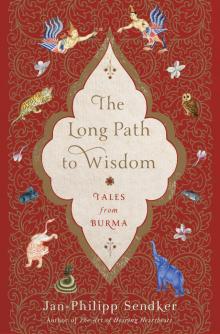- Home
- Jan-Philipp Sendker
The Long Path to Wisdom Page 8
The Long Path to Wisdom Read online
Page 8
It was an unaccustomed honor to welcome such an esteemed and erudite judge to the village. When the much-anticipated day of the hearing arrived and the first fiery sunbeams were just touching the fields, nearly all of the village’s inhabitants turned out to see for themselves what light the hare meant to shed on the confusing case of the mismatched farm animals. The prolonged conflict had divided the community and disturbed the idyllic peace that normally reigned in the village. The inhabitants hoped that the hare’s ruling might serve to restore the calm and the introspective quiet they had previously enjoyed. While they waited patiently, scanning the landscape for the first signs of their approaching guest, the early-morning sun began its leisurely ascent. The morning came and went in this fashion without any sign of the hare. Even during the midday hours, when the sun burned mercilessly down on them, the villagers bore the blazing, murderous heat without complaint, hoping still for the arrival of their noble guest. As the sun slowly set, however, concern and a growing disquiet gradually took hold. The hare was renowned not only for his abilities as a judge, but also for his reliability and punctuality. It was quite unlike him to break a promise, and the villagers understandably wondered whether some misfortune had befallen him on the road. As sunset neared they had largely abandoned hope that the case would be solved, but just as they were making ready to return home, the hare suddenly appeared. Everyone present was relieved to see that he was in excellent condition, and they were curious what could have so drastically delayed his arrival.
Although the hare’s judicial competence was widely acknowledged and would never have been questioned under normal circumstances, the villagers, who knew of his notable penchant for punctuality, peppered him with questions about what had detained him. Fortunately the hare was in no way offended, but promptly provided an explanation: He had been on his way to the assembly just as planned when he suddenly spied a sand hill glowing red in the middle of a river. It had caught fire, and was fully ablaze. Noticing a rattan basket in the vicinity, he had filled it with water and tried to quench the fire, but it had taken him until evening to do so. Although several villagers found the justification a little odd, the sly neighbor understood that this unlikely story was really some kind of test, and he jumped at the chance to demonstrate his intellectual acumen. He refuted the hare’s excuse with the argument that it made no sense for a sand dune that was surrounded by water to catch fire. Furthermore, he pointed out, it would be impossible to transport water in a rattan basket, since it would simply leak through the gaps between the slats. He could not possibly have put out the fire in this way. In closing, the hare’s story stood in contradiction to the laws of nature and could not therefore be true.
The hare was extremely pleased to hear these words. He congratulated the farmer on his keen powers of comprehension and on his insights into the laws of nature. The farmer basked proudly in the hare’s praise. Given that he had demonstrated beyond a doubt his firm grasp on the detailed workings of nature, the hare went on, he would certainly recognize that the assertion that a cow had given birth to a foal and a mare to a calf did not correspond to the laws of nature. And in order to bring the exasperating matter to a close, the hare insisted that the clever farmer return the foal to its rightful owner. The villagers were overjoyed to see the altercation put to rest so justly and in such an astonishing way—the sly neighbor had furnished the decisive argument himself. No wonder the hare is the first choice in the animal kingdom whenever a judge is needed to settle a dispute.
One afternoon Mouse and Elephant met in the jungle and fell to chatting about things they had seen and done. As they clambered over the roots of mighty trees and beat their way through the thick undergrowth, the elephant told the following tale:
“Earlier today I was walking along minding my own business when I suddenly heard a heavy stomping. I caught sight of a vicious elephant I know. Hoping to avoid him, I turned and ran behind a dense stand of trees. As I did so one of the lower branches gouged a serious cut in my back. You can see that it is more than two feet long.”
“I’m sure that hurts,” opined the mouse. “But with all due respect, my dear Elephant, please recall that you were never in mortal danger—neither the elephant nor the branch could have killed you—whereas I was hunted by a wildcat today. She nearly caught me, too! One of her claws left a large wound in my side. You will see that it is at least two feet long.”
The elephant smiled. “As much as it pains me to accuse you of lying, I can’t help but observe that your whole body, from the tip of your nose to the tip of your tail, is not even one foot long. How do you reconcile that with your story of a two-foot scratch?”
“Mark these words, my large friend,” the mouse answered. “To each his own foot! You may measure your scrapes with your large feet, but then you must in turn allow me to measure my injuries with my own little paws.”
There was a time when the thrush’s feathers were not black, as they are today, but glistened in all imaginable hues. Back then, one might often see the thrush joyfully winging through the forest, leaving behind her an explosion of shimmering colors. She was especially close friends with an owl who made her home in a large hollow tree. The unlikely pair were often seen flitting through the thick underbrush searching for tasty fruits and delighting in each other’s company.
Each night at sunset, exhilarated by the prospect of the cool evening air, the thrush would begin to sing out lovely melodies with her bewitching voice. This was for the owl an unmistakable sign that it was time for her to leave her resting place and join her friend in swooping through the forest. One evening, however, as the little songbird perched on the edge of her nest and trilled an especially beautiful composition, the owl did not appear. This was extremely unusual. The thrush waited awhile, but alas it was in vain. When the next evening she sang the owl’s favorite song and she still did not appear, the small bird began to worry about her friend.
Fearing something dreadful had happened to her companion, she took a detour through the forest to the owl’s nesting place.
As she drew near but while yet some distance away she noticed a brightly shining light directly behind the entrance to the hollow tree trunk. The glow had a magical effect that transfixed her with such a strong power of attraction that she completely forgot to make her presence known as she approached. She peeked into the tree cavity and what she saw took her breath away. There in her friend’s nest she found a pile of precious gems so numerous that they spilled over the edge and littered the floor of the hollow tree. Surprised by the unexpected arrival of the thrush, the owl was struck dumb and could only sit there gaping with a distrustful air. Warily, she asked her friend why she did not let her know that she was coming. The thrush assured her that she had come with the best of intentions: She wanted to see if all was well; she had missed their nightly outings. Now she was relieved to find that no ill had befallen the owl, but rather unbelievable good fortune. Unable to comprehend the riches that lay before her, the little thrush asked her companion how she came to possess this grand treasure. Before answering, the owl peered through the tree branches to make sure that her friend had actually come alone and that nobody was within earshot. When she was sure no one else was listening she made the thrush swear to reveal the secret to no one. Only then did the owl explain how she was able to obtain the jewels.
One night while hunting, thanks to her notoriously excellent eyesight and sense of hearing, the owl heard unusual sounds and decided to investigate. She followed the sounds to the outermost edges of the forest, where she discovered a strange light that illuminated the surrounding forest floor, bathing it in a soft glow. She felt the same overpowering attraction emanating from the light that had pulled the thrush toward the owl’s nest. The source of the glowing light, she discovered, was coming from inside a cave. Entering the cave, she saw, to her astonishment, that it was filled from top to bottom with gemstones. Looking around and seeing no one, she immediately set to work gathering as m
any as she could carry. Her greed proved greater than her own strength, however, as the stones turned out to be so heavy that even with her formidable size, she was unable to carry them all. Panting with exertion and gasping for air, she was finally able to reach the entrance of the cave with her loot, only to discover that the opening was blocked. The ogre tasked with guarding the cave and its treasure had returned. In fear of retaliation from the huge monster that had just caught her red-handed, the trembling owl immediately dropped her prize. The helpless bird shuddered as the ogre loomed over her and she felt his hot breath. With a booming voice amplified even further by the cavernous echoes, he berated her avarice and pointed out that the plunder she intended to steal was far too heavy for her to carry back home. Surprisingly, the ogre refrained from punishing her for the theft. Quite the contrary. Considering that the cave, filled as it was with jewels, did not offer him enough living space, he made her a generous offer. Under the one condition that she not become greedy, he would give her some of the gems to keep. He would allow her to come each day and help herself to the treasure, provided that the amount she took never exceeded her own body weight. Should she fail to keep this agreement, a punishment would follow, and the offer would be rescinded, the ogre warned.
Since then, the owl had returned to the cave every day to collect her gift. She was careful to take only the permissible quantity of jewels. This activity had kept her so occupied over the past few days that she had been unable to accompany her friend during their usual excursions in the forest. As the owl told her amazing story, the little thrush listened intently, ogling the owl’s glittering treasure all the while. How lovely it would be to have some of those shining jewels, she thought longingly. When the owl finished her story, the thrush was unable to resist asking her friend whether she might also be allowed to share in these unforeseen riches. The owl supposed it was possible, as long as the ogre’s conditions were upheld and only the specified amount of stones were removed from the cave each day. She reminded the thrush that breaking the rule would provoke the ogre’s wrath, put an end to his generosity, and forever cut them off from access to the treasure. Without hesitation, the little thrush promised the owl that she would adhere to the ogre’s rules and never take more than the allotted amount.
As soon as they could, the owl and thrush flew together to the cave of amazing treasure. The little thrush could only stare in wonder at the great mountain of glittering gems, which was even larger than she could ever have imagined. Very careful to follow the ogre’s instructions, the friends began to search the cave for the very finest gems, whereby they made sure that neither of them took more than their own weight in stones. When they were finished, in spite of all the excitement, the thrush could not help but notice that the owl’s load was much greater than her own. Undoubtedly, the reason for this lay in the fact that the owl’s weight and stature greatly exceeded those of her tiny companion. Fortunately, the thrush was so thrilled with her sparkling treasure that she was able to shake off the envy that briefly arose in her and console herself with the thought that her bundle would be much lighter to carry than the owl’s.
From then on each day the small thrush returned to the cave, sometimes accompanied by the owl, but also sometimes alone, and she always made sure that the weight of her stones never exceeded her own body weight. Yet she found it increasingly difficult to suppress the thought that the owl was able to take more jewels each time she visited the cave. Bit by bit this thought grew in her mind from a small trickle to a mad rushing river that consumed her every moment. When she could no longer stand the injustice, she decided to act. After all, the owl’s size gave her an unfair advantage in this arrangement. It wouldn’t hurt anyone if she just once took more than her own weight in stones, the thrush decided. It would be a way to set things right.
Firm in her resolution to ignore the ogre’s restrictions, the thrush loaded herself down with a pile of precious stones that greatly outweighed her. When she had enough, she hurried with her heavy load to the cave entrance. Before she could reach it, however, from the dark recesses of the cave, the ogre suddenly appeared before her. He was a dreadful sight; sparks flew from his eyes and he glowed red with anger. The one condition he had put on his generosity had been broken. Petrified, the little thrush released her ill-gotten spoils and attempted to fly as fast as her wings could carry her toward the exit. But she was not quick enough to escape the wrath of the ogre. He opened his mouth and spewed out fire, turning the cave into a sea of flames that surrounded the fleeing thrush. As her splendid plumage ignited, the little thrush reeled midflight and sank to the cave floor, where she rolled in the damp earth trying to smother the flames. Only after the last of her shimmering vibrant feathers were charred an ashen gray was she able to extinguish the blaze.
Although her extraordinary voice remained, her magnificent outward appearance became once and for all a thing of the past: the price she paid for her greed. Now, if one should happen upon the inconspicuous thrush in the woods, one may be forgiven for overlooking this drab little creature whose song holds such magical powers.
There once lived a king who was renowned throughout his realm and even beyond it for his incorruptible sense of justice. It was widely known that no one could buy his favor and that his judgments always adhered strictly to the letter of the law.
When the news arrived that one of his wives had borne him a son, he declared, deeply gratified, that this child would one day be king.
Later that very day the monarch learned that he was the father of yet a second infant boy, and he decreed that this younger child should be the crown prince. Furthermore he announced that he would step down from the throne to become a hermit at a monastery in the mountains the day his sons turned eighteen.
On their eighteenth birthday the two young men were preparing for the coronation. The sky was a deep, vibrant blue; the sun stood directly over the castle. When the future ruler noticed this, he lifted his bow and arrow, aimed for the sun, and cried, full of arrogance: “Who dares to put themselves above us and thereby to look down on us?”
“The sun is our mother,” one of the king’s ministers chided him. “You should kneel humbly before her and be thankful.”
The young man did as he was told.
A short time later a crane was circling the palace. When the younger prince spotted it, he bent his bow, aimed, and cried, full of arrogance: “Who dares to fly above us, the future king and crown prince, and thereby to look down on us?” With one well-aimed arrow he shot the bird out of the sky.
When the crane’s wife learned of her husband’s death, she flew to the king. Outraged, she recounted what had happened and demanded justice.
The king summoned his ministers and his two sons to inquire whether the accusation was correct. Everyone confirmed the bird’s testimony. Full of remorse, the crown prince pleaded for mercy. But the father knew no pity. With a heavy heart the king pronounced the sentence as dictated by the law: His younger son must be put to death.
The older brother objected, saying that he himself was to blame. Had he never threatened the sun with his reckless, haughty gesture, it would never have occurred to the younger brother to do something similar. By law he must also be executed for inciting a murder.
It nearly broke the king’s heart. But no one was above the law, not even his sons, and so his firstborn, too, was condemned to die. Both sentences were to be carried out the following day.
Early in the morning there was already a considerable crowd gathered by the scaffold. The people were grumbling because many considered the sentences too severe.
As the executioners led the two princes into the square, a loud murmur went through the crowd. Both mothers came forward on their children’s behalf, fell on their knees, and begged tearfully for leniency. The onlookers echoed their pleas, but the headsmen would not be moved. The law was the law. Judgment had been passed.
The two princes, bound hand and foot, were made to knee
l. The calls for clemency grew louder. When the first executioner lifted his ax, the throng stormed the scaffold and disarmed the two men in an outright brawl.
With bloody noses and gaping wounds, it was now the executioners’ turn to plead their case. Surely it would not be long before the crane’s widow learned that her husband’s killers had not been executed, they insisted. She would appeal to the king and they, the executioners, would pay the price. Then one of them had a brilliant idea: He asked the people to retreat for a time so that they would have an opportunity to deceive the bird. The two princes, having been smeared with the blood of the executioners, lay down on the spot where they were meant to have died.
No sooner had they taken their positions than the crane’s widow flew into view. She circled over the empty square and saw the two young men lying there covered with blood. Satisfied, she turned away. Justice had been served, and now she was ready to be quit of the land where she had lost her husband.
Her powerful wings beat the air as she flew away, never to return.
In the town of Tagaung there once lived a respected blacksmith. He was a hardworking man, a master of his craft with a powerful physique. It came as no surprise that a man of such gifts would have a son renowned for his bear-like strength, a giant named Maung Thin Htet, “The Strong Man.”
Visitors came from near and far to marvel at Maung Thin Htet, and tales of his unusual strength spread like wildfire through the whole country until they reached the king’s palace.

 The Language of Solitude
The Language of Solitude A Well-Tempered Heart
A Well-Tempered Heart The Art of Hearing Heartbeats
The Art of Hearing Heartbeats The Far Side of the Night
The Far Side of the Night Whispering Shadows
Whispering Shadows Dragon Games
Dragon Games The Long Path to Wisdom
The Long Path to Wisdom